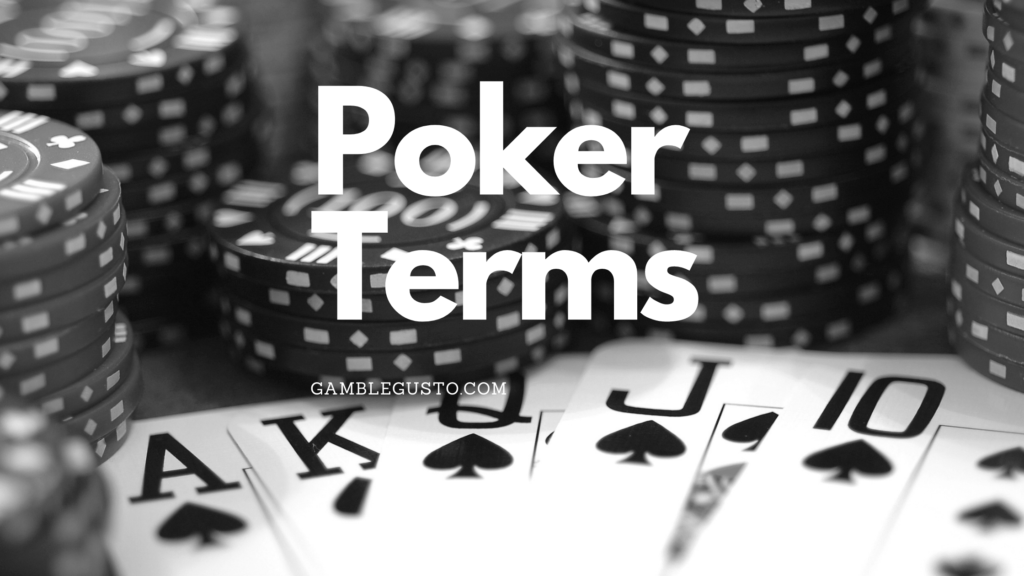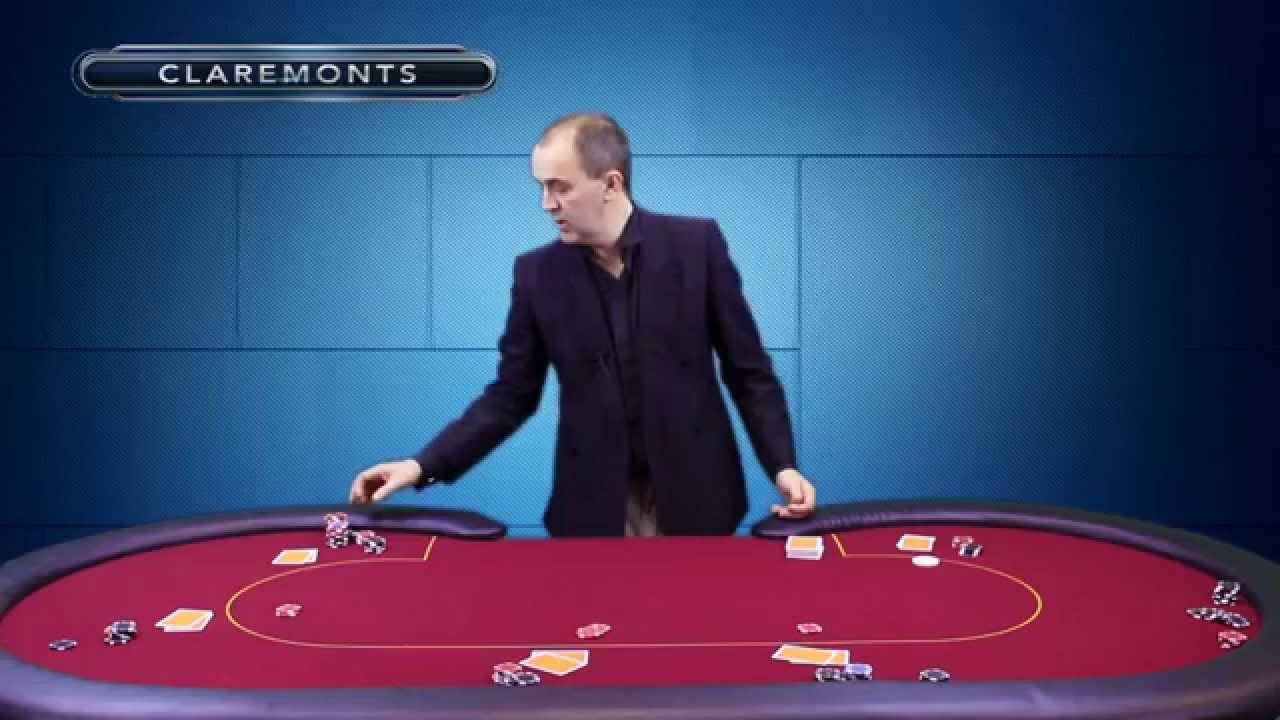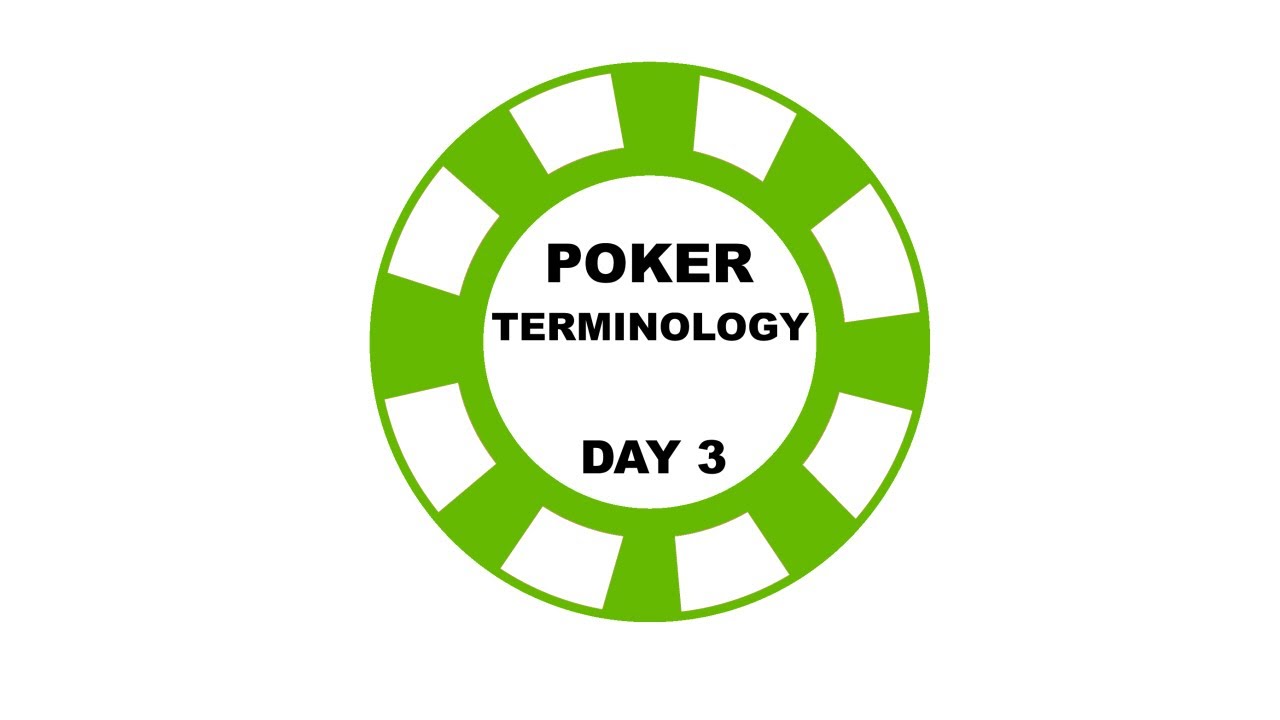Most Important 35 Poker Terms: Uncommon Poker Terms That You Should Know
This dictionary of popular poker vocabulary will assist you in locating the most commonly used poker phrases as well as certain slang words that are prevalent in poker games.
Author:Darren McphersonReviewer:Daniel JamesSep 13, 20219.5K Shares329.2K Views

Many poker terminology and phrases may be unfamiliar to those who are not familiar with the game. So, if you want to take it seriously, you'll need to master poker terms and all the associated jargon.
You'll have a better experience playing and debating with your pals if you understand the game's terminology.
This dictionary of popular poker vocabulary will assist you in locating the most commonly used poker phrases as well as certain slang words that are prevalent in poker games. The poker dictionary has a complete list of different sayings, but here are the keywords to be aware of.
Glossary Of Poker Terms

Poker: The Terminology
A-Game
This phrase refers to a condition in which you are playing and feeling your best.
When you're on your "A-Game," you're making the correct choices, concentrating on what counts, and weighing all the available information.
You are just doing your best effort.
It's worth noting that you may play your "A-Game" and still lose due to volatility, but that doesn't imply you didn't do your hardest and just got unlucky.
Abc Poker
It refers to a simple style of play that is based on a basic understanding of the game.
The "ABC player" will avoid odd bluffs and wild plays in favor of conventional tactics.
This strategy may be successful against extremely weak recreational opponents, but more experienced players can rapidly see such patterns and exploit the "ABC poker player's" limited arsenal.
Ace-High
A poker hand featuring an Ace as the top card, but no pair or other stronger combination. If you have an A8 and the board is K J T 5 3, for example, you have an Ace-high hand (A K J T 8), since no other combination is conceivable.
Action
The word "move" in poker refers to how you make a decision at the poker table. Everything you do when it's your time to act is referred to as an action, and you have five options: bet, raise, fold, call, or check.
Action Card
This poker phrase refers to a particular card that appears on the turn or river and is thought to strengthen the hands of two or more players remaining in the game. As the name implies, it may result in a lot of betting and raising activity in order to raise the pot.
Acting Out Of Turn
When a player announces his actions vocally, such as folding, checking, or even placing the chips, it is not his turn to act.
It may be done inadvertently or on purpose to observe how other players respond in order to get more information. It may be an "angle shot" if done on purpose, which is unjust conduct.
Active Player
An active player is one who hasn't folded and still has their hand in the game.
Add-On
Only used in rebuy poker events, the add-on enables you to buy additional chips after the rebuy time has expired. Add-ons are optional, so you may choose whether or not to purchase additional chips.
However, you will get more chips for the same buy-in fee in many events, making it a lucrative option.

How To Master Poker Terms - Part One
Aggressive
When a player decides to bet or raise instead of calling or checking, it is referred to as aggressive play.
Most of the time, such players will increase the pot, and instead of attempting to find a cheap showdown, they will continue to gamble.
Air
A is an extremely poor holding, having little intrinsic worth and just a small possibility of improving with more cards.
All-In
The player is all-in when he bets all of his remaining chips (his whole stack). It implies he's already placed all of the money in the pot and won't have to do anything more with the money in his hand.
American Airlines
A colloquial phrase for a beginning hand consisting of pocket aces (AA).
Angle Shooting
It entails doing any activity that gives you a competitive edge over your opponents. While it isn't strictly cheating, it may nevertheless get you into a lot of trouble in certain poker rooms and should be avoided.
Because angle shooting in poker is such a broad subject, I created a separate post with lots of examples and practical advice.
Ante
It's a modest wager that all players must make before the hand begins. It is most often seen in poker tournaments, although it may also be found in cash games.
For example, in a 40/20 game with a 5 ante, the large blind is 40 chips, the small blind is 20 chips, and each player at the table must ante the dealer with 5 chips in order to raise the pot size.
Backdoor Draw
In order to create a winning hand, you must hit both the turn and river cards. You could have a backdoor flush draw (for example, Ah Jd on Kh 7h 3c, which means you need a heart on the turn and another heart on the river to make a flush) or a backdoor straight draw (for example, AT on K 9 3, where you need exactly Q and J to make a straight).
Back In
On the first betting round, enter a pot by checking and then calling someone else's open.
Typically utilized in games such as jackpots, this term refers to entering without using any openers.
Back Raise
A player who has previously called in the same betting round reraises.
Bad Beat
To lose a hand in which one of the hands is much better than the final winning hand.
Playing a variety of hands in the same manner in order to make it more difficult for an opponent to learn valuable information about a player's hand.

Poker Terminology
Bank
The person in charge of distributing chips, keeping account of buy-ins, and paying out winners at the conclusion of the game is known as the house.
Bankroll
To finance someone's participation in a game, a player must bet a certain amount of money throughout the course of their poker career. Staking is a similar concept.
Bankroll Management
To prevent depleting a bankroll during downswings, use the right stakes and game style.
Call
To make the smallest possible contribution to the pot in order to continue playing a hand.
Check
To refrain from betting. There's nothing to call if there's no action (bet) in front of you. You may just "check" if you don't wish to wager. If your other players in the betting round take further action, the action will come back to you to call, fold, or raise.
Check-Raise
When a player checks on the first bet chance and then raises any future bets in the same betting round, this is known as a check-raise.
Cold Call
In your turn, you may call two or more bets. You're cold calling if a pot has already been bet and raised before it reaches you.
Connector
Pocket cards that are in order. Connectors would be a 5 of clubs and a 6 of hearts. "Suited connectors" are those in which the connectors are of the same suit, such as the 5 and 6 clubs.
Community Cards
All players may utilize the cards that are dealt face up in the middle of the table to make a hand.

A Glossary of Online Poker Terms by Casoony
Dark
An action did prior to the player obtaining knowledge to which he or she would otherwise be entitled.
Dead Blind
A blind that is not live in the sense that the player who posts it has no opportunity to raise it if other players simply call it.
A small blind is usually posted in addition to a live blind equivalent to the large blind by a player joining or returning to a game (in a position other than the big blind).
Dead Button
Dead button regulations may be found here.
Dead Hand
A player's hand that is ineligible to participate in the deal for any reason, such as being fouled by touching another player's cards, having the incorrect number of cards, being given to a player who did not make the required forced bets, and so on.
Dead Money
Other than the equal sums staked by active remaining players in the pot, the amount of money in the pot. Dead money. A donation to the pot by folding players, a dead blind posted by a player returning to a game after losing blinds, or an unusual chip left in the pot from a previous transaction are all examples of dead money.
For example, suppose eight players each ante $1, one player opens for $2, and two players call, resulting in a pot of $14.
Three players have now contributed $3 to the pot, totaling $9 in "live" money; the remaining $5 (representing the antes of the players who folded) is "dead" money.
The pot odds of plays or rules of thumb that are dependent on the number of players are affected by the quantity of dead money in the pot.
The phrase "dead money" is sometimes used in a pejorative meaning to refer to money placed into the pot by players who are still legally able to win it but are unlikely to do so due to their inexperience, thus boosting the anticipated return of other players. This may also be used to describe the player: "Let's invite John every week; he's dead money."
In tournaments, the phrase "dead money" refers to when a large number of casual players join events with little possibility of winning.
Deal
distribute cards to players according to the rules of the game currently being played. A single game of poker starts with shuffling the cards and ends with the awarding of a pot.
Also known as a hand (though both terms are ambiguous). An agreement to divide tournament prize money in a way that differs from the payments disclosed
Deal Twice
When two players are in a big pot and one goes all-in in a cash game, they may agree to deal with the remaining cards twice.
If one player wins both hands, the whole pot is theirs, but if both players win one hand, the money is divided. Also, play and run the game twice.
Jump to
Glossary Of Poker Terms
A-Game
Abc Poker
Ace-High
Action
Action Card
Acting Out Of Turn
Active Player
Add-On
Aggressive
Air
All-In
American Airlines
Angle Shooting
Ante
Backdoor Draw
Back In
Back Raise
Bad Beat
Bank
Bankroll
Bankroll Management
Call
Check
Check-Raise
Cold Call
Connector
Community Cards
Dark
Dead Blind
Dead Button
Dead Hand
Dead Money
Deal
Deal Twice

Darren Mcpherson
Author
Darren Mcpherson brings over 9 years of experience in politics, business, investing, and banking to his writing. He holds degrees in Economics from Harvard University and Political Science from Stanford University, with certifications in Financial Management.
Renowned for his insightful analyses and strategic awareness, Darren has contributed to reputable publications and served in advisory roles for influential entities.
Outside the boardroom, Darren enjoys playing chess, collecting rare books, attending technology conferences, and mentoring young professionals.
His dedication to excellence and understanding of global finance and governance make him a trusted and authoritative voice in his field.

Daniel James
Reviewer
Daniel James is a distinguished gerontologist, author, and professional coach known for his expertise in health and aging.
With degrees from Georgia Tech and UCLA, including a diploma in gerontology from the University of Boston, Daniel brings over 15 years of experience to his work.
His credentials also include a Professional Coaching Certification, enhancing his credibility in personal development and well-being.
In his free time, Daniel is an avid runner and tennis player, passionate about fitness, wellness, and staying active.
His commitment to improving lives through health education and coaching reflects his passion and dedication in both professional and personal endeavors.
Latest Articles
Popular Articles
